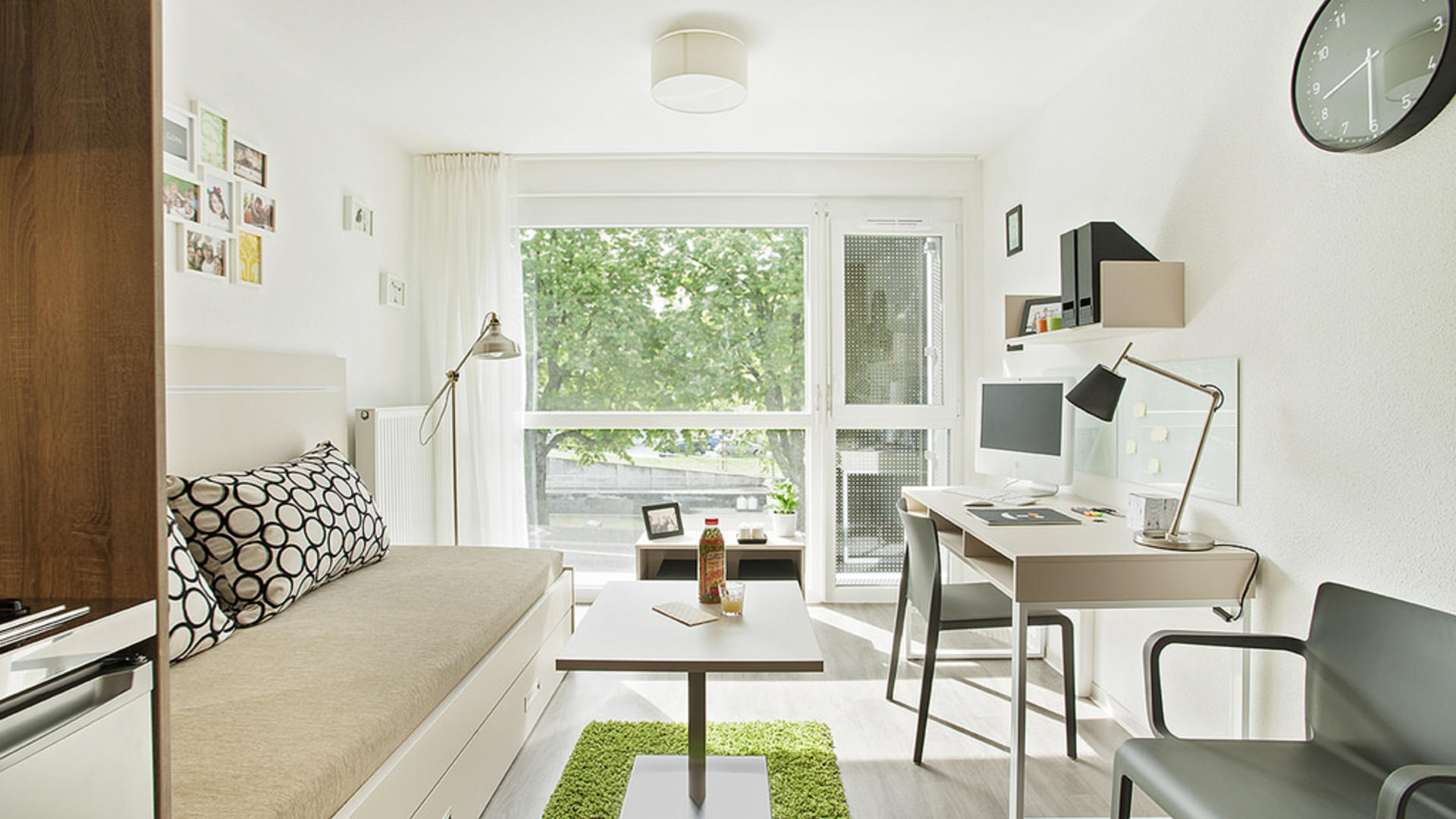THE DIFFERENT TYPES OF LODGING FOR STUDENTS IN FRANCE

It isn't always easy to find student lodging in the large French cities. And yet there are many different solutions to problems of accommodation. A tip: start your search as soon as possible.
THE CROUS UNIVERSITY RESIDENCE ROOMS
The rooms in the university residences, also called cités U (U-residences), are managed by the CROUS (Regional Centres of University and Academic Services). This is the cheapest type of student lodging. Contact the international relations department of your institute to find out if they have a specific agreement with the CROUS.
At the same time, check the “accommodation" and "international" sections of your CROUS site to learn about the conditions for assigning a university residence room. To receive one, you must prepare an "international lodging" application and submit it between January 15th and May 31st before the start of the academic year.
There is one CROUS per educational region and each has its own way of doing things and its own Internet site. Make sure you deal with the CROUS affiliated with the region that the institute of higher education where you are registered is attached to.
THE CIUP - PARIS INTERNATIONAL UNIVERSITY CAMPUS
Located in Paris's 14th arrondissement, the Cité Internationale Universitaire de Paris (CIUP) is a vast grouping of university residences. It is home to nearly 6,000 students, researchers, artists and high-level athletes from around the world. Room rates vary according to comfort, the age of the occupants and the length of the stay.


STUDENT LODGING WITHIN YOUR INSTITUTE
Some institutes of higher education, in particular the Grandes Ecoles, have their own student accommodation. To learn about the conditions for assigning residence there, contact the accommodation department of your future institute.
STUDENT LODGING IN A RESIDENCE
You may have access to student lodging in a student residence or a residence for young people. These provide accommodation in which the rent is somewhere between that of a room in a university residence and that of a private student residence.

STUDENT LODGING IN A PRIVATE RESIDENCE
Many private student residences are open to foreign students. Room or flat rental is often higher than in the CROUS university residences because of the shared services included in the lease: laundry room, Internet, gym, etc.
STUDENT LODGING WITH PRIVATE OWNERS
If you can't get student lodging with the CROUS, nor in a student residence or a private residence, you will have to go with a private lessor, either an individual or an estate agency, to find a room or flat.
In this case, to lower your expenses, you can decide to share accommodation. You will share the lodging with other students, which will greatly reduce the cost of the rent: an economical and social way to obtain student lodging.

STUDENT LODGING WITH A HOME OWNER
Ideal for practising your French, lodging with a host family is a practical and economical lodging. In most cases, it means a private room in a house or flat.
Some host families offer lodging in exchange for services. The rent is low, sometimes even free. To obtain this, you must perform a certain number of tasks (house chores, babysitting, etc.).
Organised by associations, intergenerational lodging lets you rent a room in a senior's home for a modest rent. In return, you must keep your host company for a few hours per week.
HOW TO FIND STUDENT LODGING
-
Don't wait until you are in France to start looking for lodging. Submit your request before you leave, whether it is for a room in a CROUS residence, in a student residence or in a private residence.
-
In general, be careful and make sure the organisation offering the lodging is reliable. Never send money without first signing a lease and speaking directly with the organisation.
-
In the beginning, don't hesitate to reserve a lodging for a short period. You will then be able to get familiar with your new environment and look for more long-term lodging when you are there.
-
It is sometimes difficult to find lodging, especially in Paris. Don't hesitate to send in several requests for student lodging to increase your chances of finding somewhere quickly.
-
Try to find student rental accommodation that is furnished. This will save you money and the problems associated with moving into a room or flat, especially if you are in France for a short period.
-
Be suspicious of rent that is too low. In Paris, expect 400 Euros for student lodging in the Cité U and up to 800 Euros for private lodging. In other cities, it costs half that, on average.
HOW TO FIND A GUARANTOR?
A guarantor is a person who acts as surety for you, and guarantees to pay your rent if you are unable to do so. In France, a guarantor is almost always required if you want to rent an apartment, whether you are French or not.
But your guarantor has to be French. If you don't have a guarantor, other options are available through the VISALE scheme, a free rental deposit if you rent an apartment in the private sector.


YOU HAVE FOUND YOUR STUDENT LODGING
Your application was accepted. Before picking up the keys and doing entry inspection of the lodging, you will have to sign the lease, or contract, for your student lodging. Payment of a deposit is often required at the time of signing. It generally corresponds to one month's rent. It is returned to you when you leave your lodging; expenses connected to the state of the lodging may be deducted from it.
Before moving in, you must have home insurance. You can do this on line. If you are responsible for paying for the gas or electricity, you will have to contact a provider for service.
SHORT LEXICON OF STUDENT LODGING
- Contrat de location, or bail (lease): contractual document establishing the responsibilities of the lessee and the lessor.
- Caution solidaire or garant (guarantor): person or entity agreeing to pay the rent in the event the renter does not.
- Dépôt de garantie (security deposit): amount requested at the start, intended to cover the cost of any damage. It is returned at the end of the rental period, subject to conditions.
- Quittance de loyer (rent receipt): receipt showing the details of the amount paid by the renter. Rent and utilities must be distinct.
- Assurance habitation (home insurance): insurance covering civil liability and any damage due to water, fire, burglary, etc.
- Caisse d’Allocations Familiales (CAF -- Family Allowances Fund): public organisation that may provide you with financial assistance to help you pay your rent.
- Taxe d’habitation (habitation tax): Tax paid by the occupant of lodging on January 1st of the tax year. The amount varies according to where the lodging is and its size.
- Préavis (notice): a renter informs the landlord of his/her intention to move out this much time prior to leaving the lodging. It is one month for furnished rental lodging and three months for unfurnished lodging, except in metropolitan centres and areas with housing shortages.






















